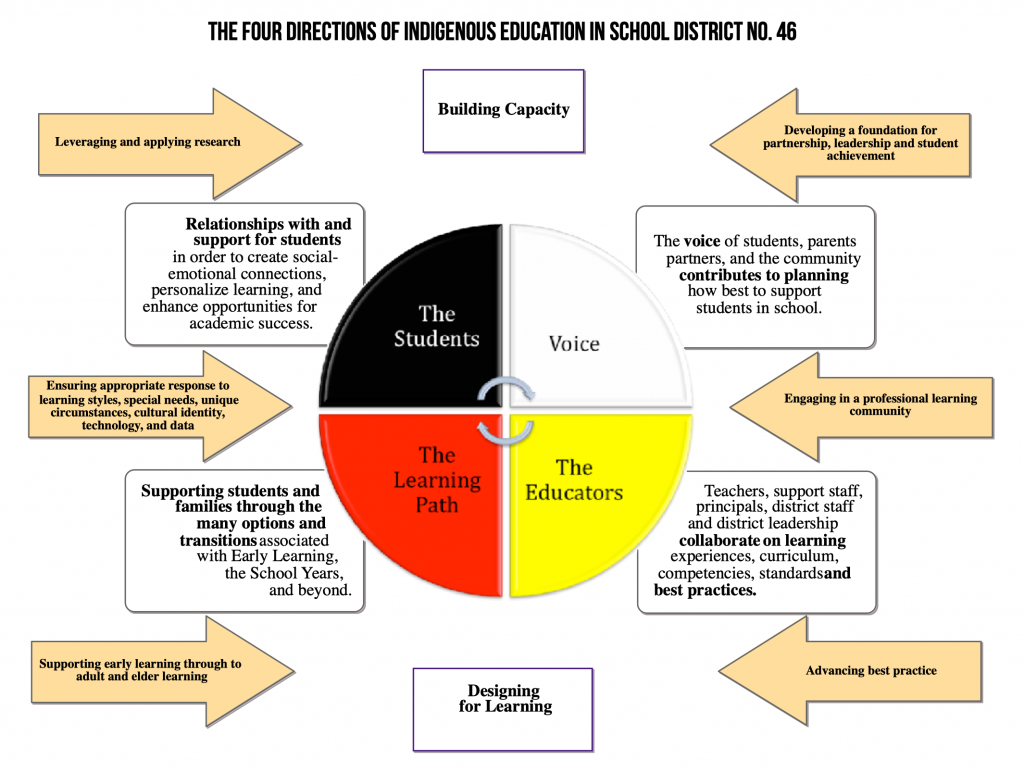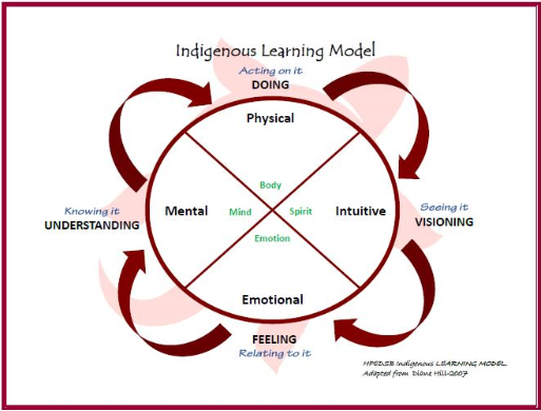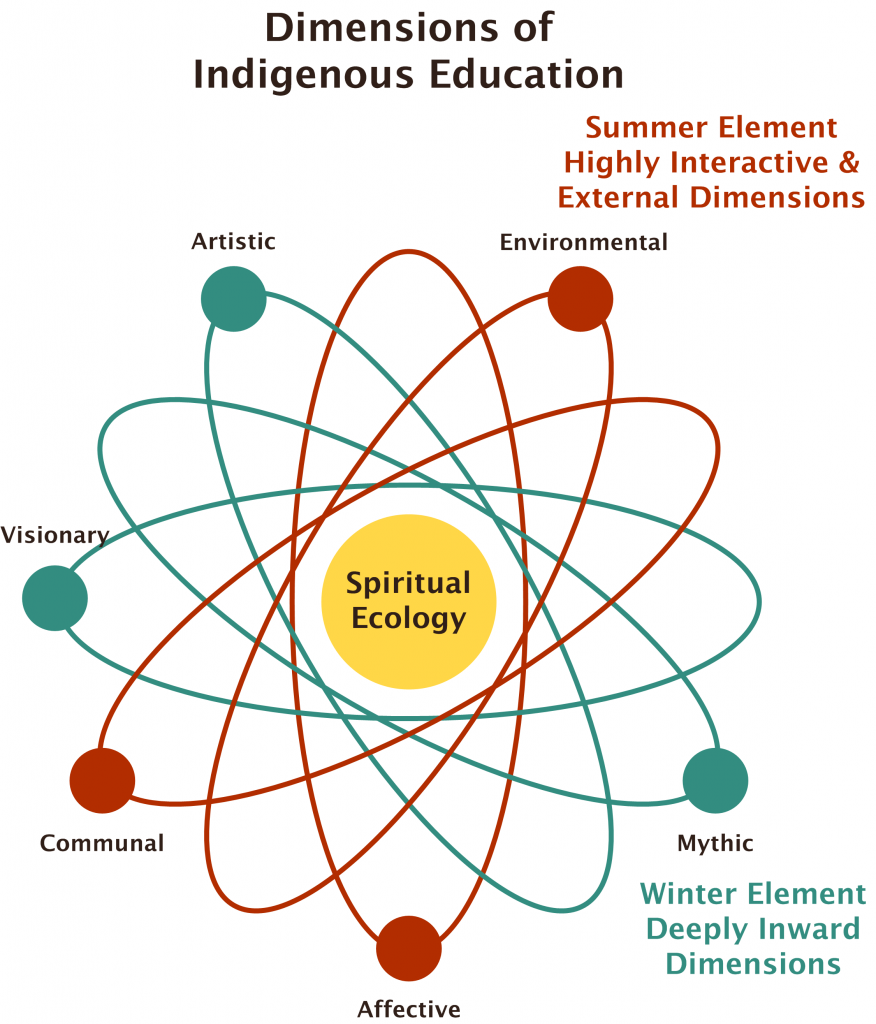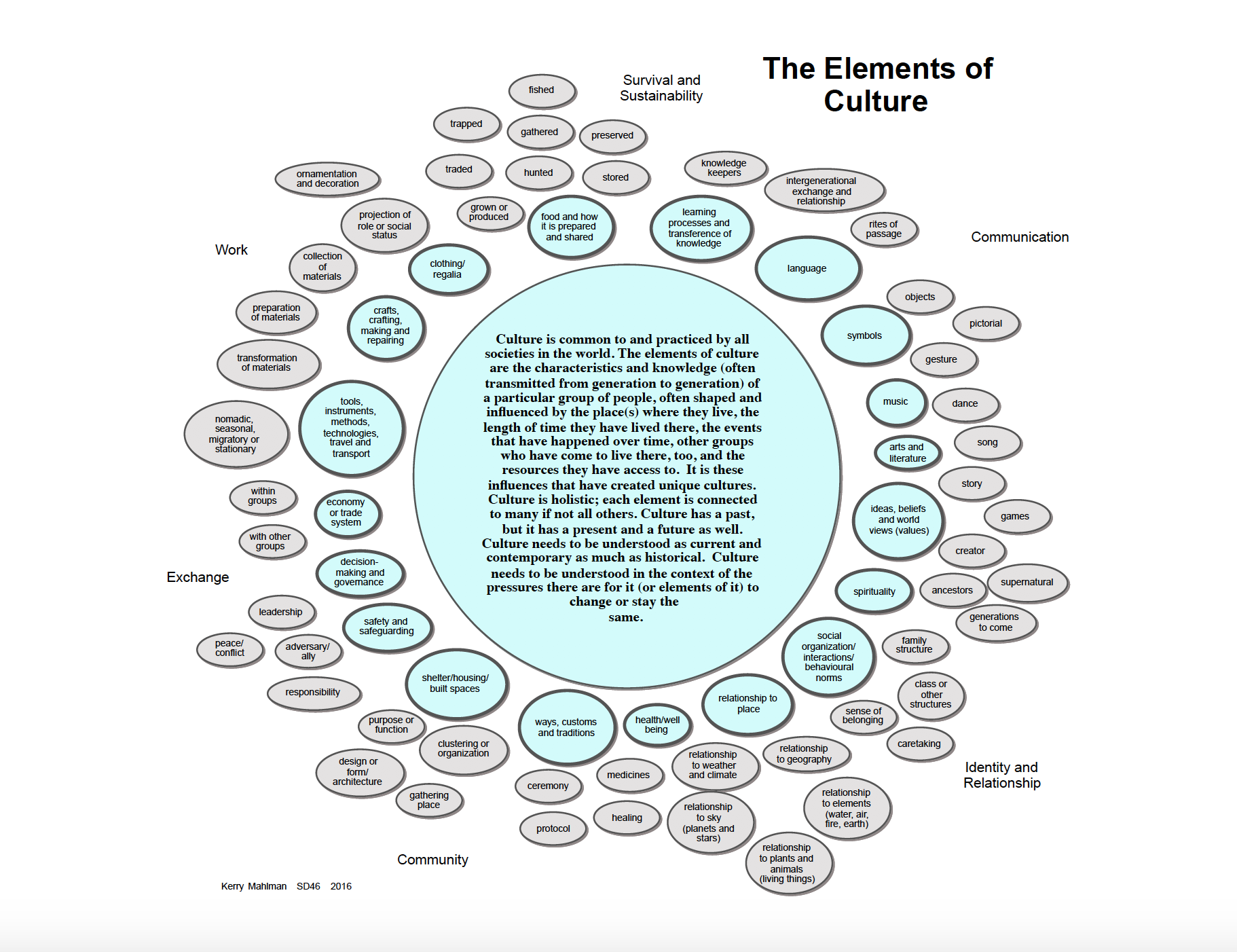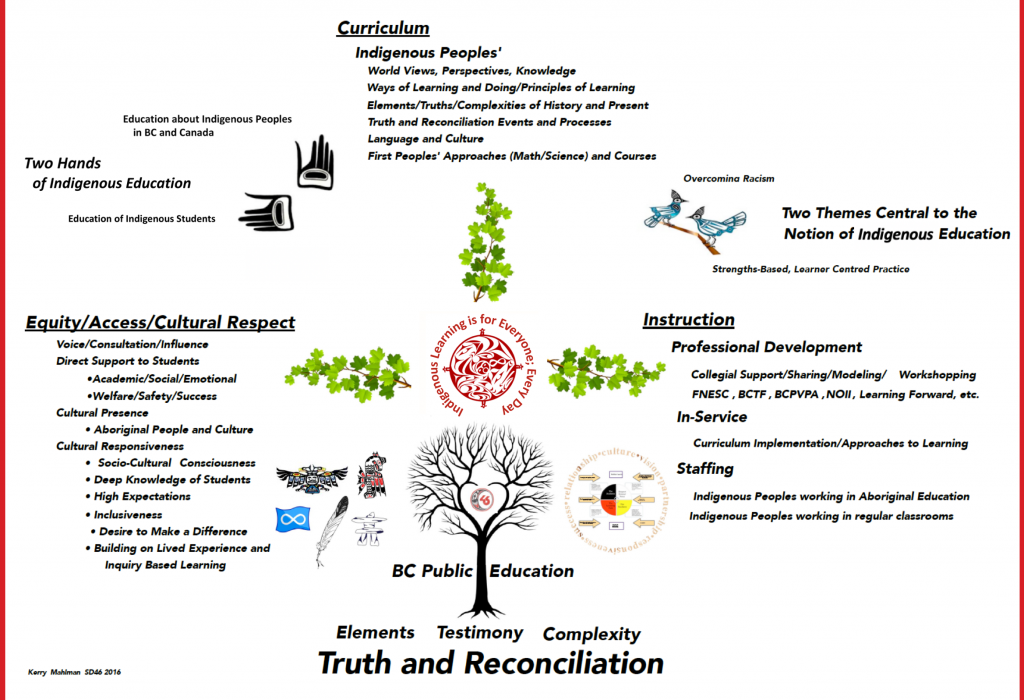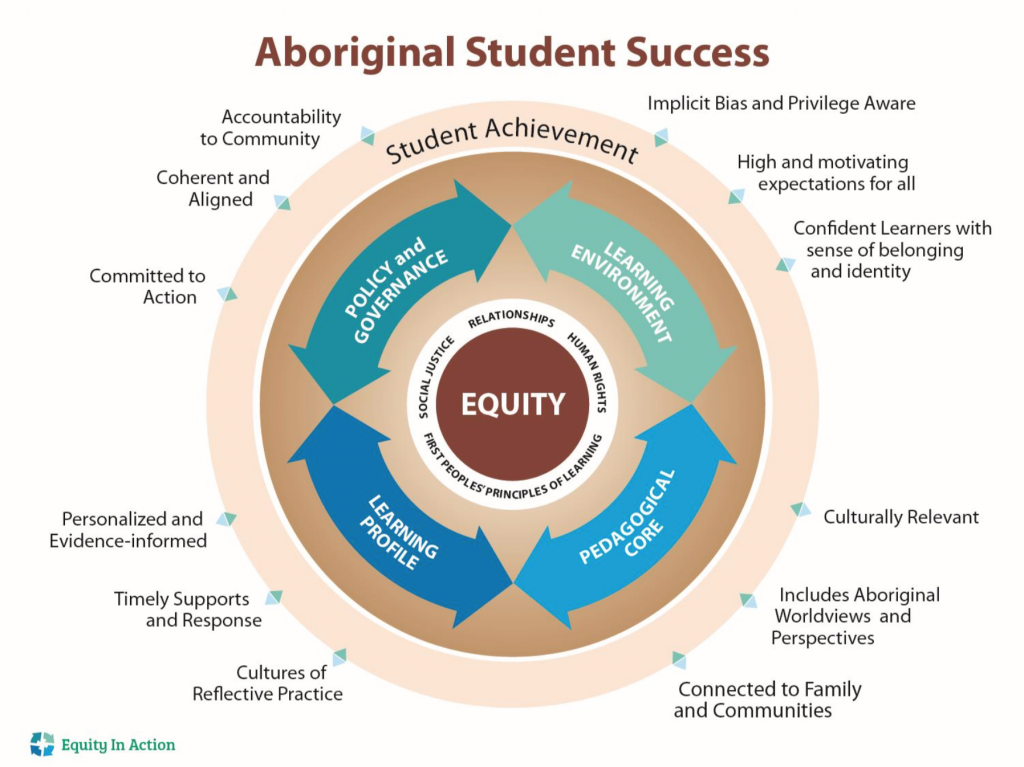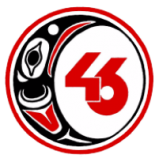Professional Development Resources
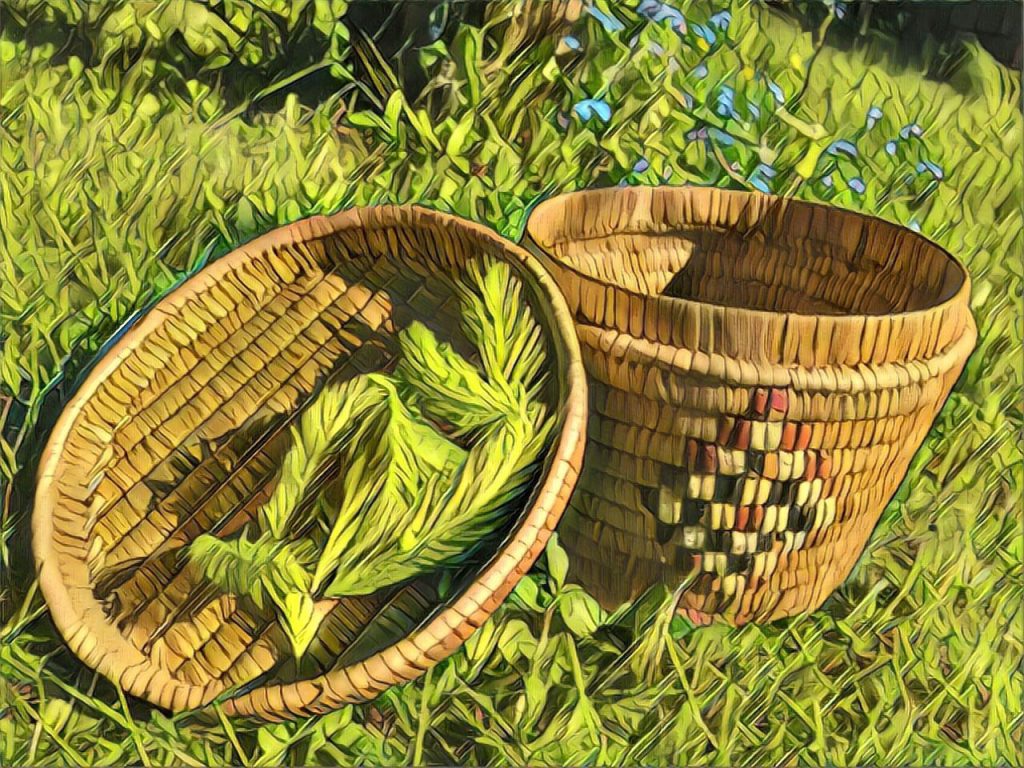
Spruce tips collected for tea. Cedar basket woven with spruce root and cherry bark, made by the Late Mary Jackson, shíshálh master weaver.
WELCOME TO THE PROFESSIONAL DEVELOPMENT RESOURCES BASKET
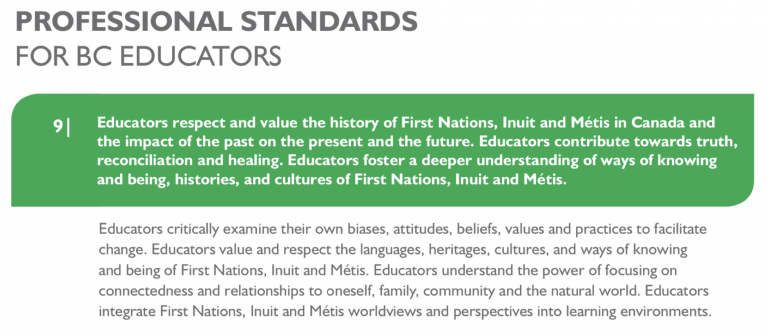
WHERE AM I ON THE JOURNEY?
If you feel you are just at the beginning (and all of us are), we invite you to walk with us.
“In This We Journey Together”
“As long as you are teaching something from a place of respect, good intentions, and you have learned or researched or received authentic teachings as best as you can, then that is all we can ask. Mistakes can happen – and you will learn from them and be able to walk on with deeper understanding. This is how we all learn – how we grow.” Elder
A Medicine Walk is a kind of inquiry. It is an intentional journey in which you slow down; shift your awareness. You self-check, reflecting on what you think you know and what you realize you don’t know. You identify what you believe you need to learn and understand in order to go forward.
The journey can involve real travel, or it can be a process of thought and heart. Either way, and sometimes even along the way, one casts off “knowledge” that is no longer valid or useful and leave it on the side of the path. You do the personal work it takes to open up to learning new things that will serve in the future. It’s about being inquisitive and adaptive – even becoming proactive and innovative in the face of change.
Click here to access a self-check tool that might help you identify where you are on the Indigenous Education journey – and where you might want to go. When you are done – you can keep this as a reminder, you can use it a part of a dialogue with colleagues, and by all means use it to spark conversation with members of the Indigenous Education team.
Thoughts on the Journey – an Invitation to Medicine Walk by Gustav Guzek (a guided contemplation)
Medicine Walk – by Kerry Mahlman (a guided inquiry)
MOVING FORWARD INTO INDIGENOUS EDUCATION
Please explore these videos, websites, resources, papers, toolkits, podcasts and blogs. Each of them is offered to support your confidence and skillset. You could work though them in order to build a foundation – or you can choose the titles and formats that seem most connected to your personal learning journey.
“Go forward with courage” Brad Baker, Skwxwú7mesh, SD44
- Nurturing the Learning Spirit (recommended) Kerry Mahlman talks of Indigenous Education on the Sunshine Coast
- Indigenous Education on the Sunshine Coast (recommended) Terry Aleck, Co-chair of the SD46 Indigenous Education Advisory Circle, talks about what he sees happening in Sunshine Coast schools
- We Are in This Together Brad Baker introduces the Three Pathways of Indigenous Education and how vital they are to leadership
- How to Become a Great Ally – None of this material may be sold, traded, or used for profit in any way. All rights retained by Lynda Gray under copyright
Moving Forward – A Video
Roy Henry Vickers and educators from around BC speak about the importance of including Indigenous Education throughout the education system.
https://www.youtube.com/watch?v=dZjshXqEk8o&feature=youtu.be
‘Teachers have one of the biggest roles to play in advancing reconciliation’: Wab Kinew
BCTF Indigenous Educaton Program
https://www.bctf.ca/uploadedFiles/public/AboutUs/ServicesHandbook/1AbEdProgram.pdf
BC’s Journey Towards Reconciliation in the Education System – A Video (highly recommended)
https://www.youtube.com/watch?v=KVTwt9gVif4
First Peoples Principles of Learning
https://firstpeoplesprinciplesoflearning.wordpress.com (Jo Chrona’s website explaining each of the principles – highly recommended)
https://www.youtube.com/watch?v=0PgrfCVCt_A (First Peoples Principals of Learning with Dr. Martin Brokenleg – from SD27)
Indigenous Worldviews and Perspectives in the Classroom:
Moving Forward – A Handbook (highly recommended)
Reconciliation and Education | Starleigh Grass | TEDxWestVancouverED
Lessons to remember before thinking about, talking about and teaching about residential schools and reconciliation.
https://www.youtube.com/watch?v=fu0aIw1vdiE
First Nations 101: Tons of Stuff You Need to Know About First Nations People – Lynda Gray
Many SD46 teachers and support staff have received a copy of this book over time. If you haven’t had a chance to dive into it – now would be a great time to pull it out. You can read it from cover to cover – or read small sections in any order. Why not form a book club with other members of your staff. Reach out and members of the Indigenous Education team will join you. We still have some copies available if you are new to the district and would like one. Just let Kerry Mahlman know. Or you can order a copy from the website below.
http://www.firstnations101.com
Indigenous Knowledge and Perspectives – The BC Curriculum K-12 (highly recommended)
Indigenous Knowledge and Perspectives are intended to intersect with the curriculum in every area of learning at every grade level. “Indigenous Learning for Everyone: Every Day”. Here is where you can find references to Indigenous knowledge and perspectives throughout the BC curriculum.
The First Nations Education Steering Committee. (highly recommended)
About FNESC http://www.fnesc.ca/about-fnesc/
With the increased inclusion of First Peoples’ content in the changing BC curriculum, there is a need to incorporate unappropriated First Peoples’ perspectives across the curriculum. The First Nations Education Steering Committee and the First Nations Schools Association, in collaboration with teachers and partners, have developed the following Learning First Peoples series of teacher resources to support English Language Arts, Science Social Studies and Mathematics courses.
The resources reflect the First Peoples Principles of Learning as well as the Calls to Action of the Truth and Reconciliation Commission, including the call to “integrate Indigenous Knowledge and teaching methods into classrooms” and “build student capacity for intercultural understanding, empathy and mutual respect.”
Please explore the resources – not just a learning resource, each one offers a professional development experience within itself.
http://www.fnesc.ca/learningfirstpeoples/ (highly recommended)
Continuing Our Learning Journey: Indigenous Education in B.C. (A series of workshops on video – very highly recommended)
Continuing Our Learning Journey: Indigenous Education in B.C. is an optional professional development resource for teachers dedicated to Indigenous learning. These modules highlight the authentic Indigenous knowledge, perspectives and content in B.C.’s redesigned curriculum.
- Module 1 Video This introductory video provides an overview of Indigenous education in BC and explores challenging common assumptions about Indigenous learners.
- Module 2 Video In this second video, ways to use the First Peoples Principles of Learning to support and transform teaching are explored.
- Module 3 Video This third video discusses finding and using authentic First Peoples resources, as well as frequently asked questions with responses from B.C. educators.
- Conclusion Video In the conclusion to the video modules, educators reflect on their Indigenous learning and invite their colleagues to continue to build an equitable education system for all learners.
Continuing Our Learning Journey: Supplemental videos
· Langley School District video – The Benefits of Taking English 12 First Peoples
· Victoria School District Video – Traditional Drumming and Singing Inquiry
Continuing Our Learning Journey: Resources
Framework for Designing Indigenous Science Resources (PDF)
What Matters in Indigenous Education (highly recommended)
This paper, What Matters In Indigenous Education: Implementing A Vision Committed To Holism, Diversit, and Engagement
explores an Indigenous approach to quality learning environments and relevant competencies/skills. It focuses on select work from People for Education and draws out the research, concepts and themes that align with Indigenous determinants of educational success.
How to Talk about Indigenous People in Canada (recommended)
Inuk journalist Ossie Michelin offers a friendly how-to guide
https://www.youtube.com/watch?time_continue=14&v=XEzjA5RoLv0&feature=emb_logo
Decolonization Toolkit
This toolkit was designed to spark conversation and growth personally, professionally, organizationally, or community wide. The toolkit can be used fully or in pieces, in order to best suites the space. In partnership with the toolkit activities there is a facilitator guide in order to make the material as accessible as possible. There is a suggested reading list to deepen Indigenous content and awareness.
What do Decolonization and Indigenization look like in the Classroom?
Filmed May 6, 2020. Special guest is Dr. Shauneen Pete (Little Pine First Nation). Resources mentioned in this video: Emma Battell-Lowman and Adam Barker’s “Settler”, Verna St. Denis Susan Dion’s “Braiding Histories”, Eve Tuck and K. Wayne Yang “Decolonization is not a metaphor”.
https://www.youtube.com/watch?v=UpHnQ6n0RkM
How to be an Anti-Racist Educator NEW
Equity Scan NEW
School District 46 will embark on doing an Equity Scan over Three Years 2020 – 2023
https://indigenous-education.sd46.bc.ca/wp-content/uploads/sites/19/Equity-in-Action-Framework.pdf
The Power of Protocols for Equity
Zaretta Hammond
Structured protocols can help teachers ensure equitable participation and create more culturally responsive discussions.
“Academic conversation is one of the most powerful practices we can bring to our classrooms to promote higher achievement (Hattie, 2012).”
Pulling Together: A Guide for Indigenization of Post-Secondary Institutions (highly recommended)
A Guide for Teachers and Instructors is part of the Pulling Together open professional learning series developed for staff across post-secondary institutions in British Columbia. The guide is also of great value to K-12 educators. These guides are intended to support the systemic change occurring across post-secondary institutions through Indigenization, decolonization, and reconciliation. A guiding principle from the Truth and Reconciliation Commission of Canada process states why this change is happening:
“Reconciliation requires constructive action on addressing the ongoing legacies of colonialism that have had destructive impacts on Indigenous peoples’ education, cultures and languages, health, child welfare, the administration of justice, and economic opportunities and prosperity.” (2015, p. 3)
https://opentextbc.ca/indigenizationinstructors/
voicEd Radio Canada
voicEd Radio Canada is a dynamic community of people dedicated to the theory, practice and policy that supports and reaffirms a strong commitment to public education in the 21st century. They encourage provocative, respectful conversations that open up new ways of thinking about something that is very familiar to all of us. It is their mission to broaden and deepen the way we talk about schools, teaching and learning in the 21st Century.
Here is an example of a voicEd Radio connection to Indigenous Education:
The Skin We’re In by Desmond Cole
A podcast for educators who understand that we need to be talking about race and racism in schools now. We will learn, and unlearn through a great book on racial justice. The first book is The Skin We’re In by journalist and activist Desmond Cole. With its Canadian and educational context, this book is a great starting point.
https://voiced.ca/project/anti-racist-educator-reads/
Flipping the Focus – A Blog
Flipping the Focus: Reconciliation Through Indigenous Education: Place as a Base for Learning
Knowledge frameworks of Indigenous and Torres Strait Islander peoples of Australia
Worldviews of indigenous peoples around the world are typically highly integrated: each aspect of culture, history and society connects with all other aspects. This is true of the worldviews or ‘knowledge frameworks’ of Australia’s First Peoples.
This workshop series content was designed with K-12 educators in mind who wish to incorporate the Indigenous arts into their educational practices. This archival website makes available resources used and videos of key presentations made during the sessions. We invite teachers and other educators from any discipline or support service area to use them to deepen their learning around Indigenous art practices.
https://www.lib.sfu.ca/help/academic-integrity/indigenous-initiatives/icrc/indigenous-art-practices
Carolyn Roberts: Moving from Performative to Accomplice…
As educators we should be asking ourselves, what can I do to make sure the next
generation is knowledgeable about the racist system we live in, so that they can change it.
https://www.carolynroberts.net/single-post/moving-from-performative-to-accomplice
REDEFINING HOW SUCCESS IS MEASURED in First Nations, Inuit and Métis Learning (recommended)
This document is based on slightly older research. However, it gives insight into how far we have come on this journey. As well, it is rich in its exploration of the definition of success and the holistic lifelong learning models of First Nations, Métis and Inuit. It asks a very important question that still hovers over the public school system in Canada – in BC: “Whose measurement of success?”
https://www.afn.ca/uploads/files/education/5._2007_redefining_how_success_is_measured_en.pdf
Alaska Standards for Culturally Responsive Schools
Sometimes it is good to look back in order to go forward. These standards were developed by Alaska Indigenous educators in the 1990s to provide a way for schools and communities to examine the extent to which they are attending to the educational and cultural well-being of the students in their care. These educators were among the first to do this kind of work and the standards deeply influenced thinking about Indigenous education in many parts of the world. These “cultural standards” are predicated on the belief that a firm grounding in the heritage language and culture Indigenous to a particular place is a fundamental prerequisite for the development of culturally-healthy students and communities associated with that place, and thus is an essential ingredient for identifying the appropriate qualities and practices associated with culturally-responsive educators, curriculum and schools.
Use these standards as an inquiry – or reflect on them in the context of your situation.
http://ankn.uaf.edu/publications/standards.html
Courses
Indigenous Canada is a Massive Open Online Course (MOOC) that explores Indigenous histories and contemporary issues in Canada.
From an Indigenous perspective, this course explores key issues facing Indigenous peoples today from a historical and critical perspective highlighting national and local Indigenous-settler relations.
https://www.ualberta.ca/admissions-programs/online-courses/indigenous-canada/index.html
Reconciliation Through Indigenous Education Massive Open Online Course (MOOC) UBC
(highly recommended)
This course will help you envision how Indigenous histories, perspectives, worldviews, and approaches to learning can be made part of the work we do in classrooms, organizations, communities, and our everyday experiences in ways that are thoughtful and respectful. In this course, reconciliation emphasizes changing institutional structures, practices, and policies, as well as personal and professional ideologies to create environments that are committed to strengthening our relationships with Indigenous Peoples.
https://pdce.educ.ubc.ca/reconciliation/
Diagrams
The diagrams below represent some basic ideas about Indigenous Education and Indigenous Cultures. They could be great studies or discussion starters.
